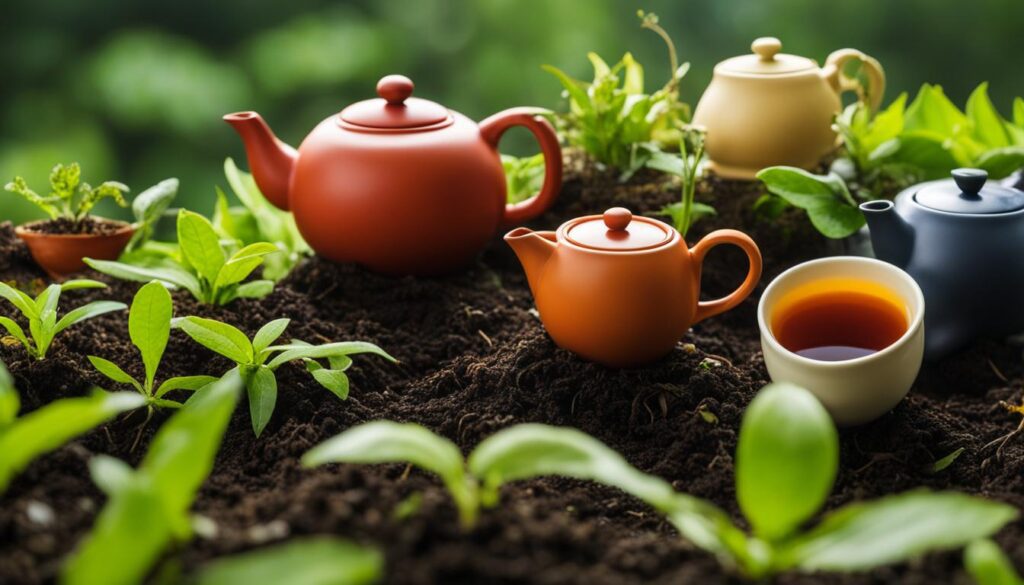Welcome to our guide on using tea as a natural plant enhancer for your home garden care. Tea, a beloved beverage worldwide, can also be a valuable addition to your gardening routine. In this article, we will explore the benefits of using tea as a fertilizer and the types of tea that can provide nourishment to your plants.
The Benefits of Using Tea for Plant Care
Tea is a natural and versatile resource that can greatly enhance your plant care routine. High in tannic acid, nitrogen, and other essential nutrients, tea provides numerous benefits for your plants. By incorporating tea into your watering and fertilizing practices, you can boost plant growth and promote overall plant health.
Brewed tea is an excellent way to provide hydration and nourishment to your plants. It delivers essential moisture to the roots, helping them thrive and encouraging the absorption of nutrients. The natural components in tea, such as tannic acid, act as a natural fertilizer, contributing to the overall health and vitality of your plants.
When used as a soil amendment, tea leaves can improve soil quality by enhancing its structure and fertility. The organic matter in tea leaves promotes beneficial microbial activity, which aids in nutrient availability and absorption by plants. As a result, using tea as a fertilizer can lead to increased leaf production, promote new growth, and support root development.
In addition to its immediate benefits, tea also provides trace nutrients that are beneficial for plant growth. These include minerals like magnesium, calcium, and iron, which are necessary for healthy plant development. By regularly using tea in your plant care routine, you can ensure that your plants receive these essential nutrients and maintain optimal health.
It’s important to note that while tea has numerous benefits for plants, excessive use can have negative consequences. Overwatering can occur if tea is used in large quantities or too frequently. Additionally, heavy metals can accumulate in the soil if tea is used excessively, which can be harmful to plants and the environment.
By using tea as a natural fertilizer and incorporating it into your plant care routine, you can harness its benefits to boost plant growth, improve soil quality, and promote overall plant health. Let tea work its magic in your garden and enjoy the beautiful results.
Types of Tea for Watering Plants
When it comes to watering your plants with tea, you have a variety of options to choose from. Any type of brewed tea can be used as an organic fertilizer for your plants, offering them nourishment and hydration in a natural way.
Green tea is rich in antioxidants and can provide numerous benefits to your plants. It supports their growth and helps to boost their overall health. By watering your plants with green tea, you can ensure they receive essential nutrients along with the hydration they need.
Black tea is another excellent option for watering plants. It contains tannic acid, which is especially effective for a wide range of plant species. The tannic acid in black tea helps to promote healthy root development and supports lush foliage.
For a more diverse range of options, you can also use herbal tea blends to water your plants. Blends like chamomile tea can be particularly beneficial for hydration, as well as providing additional nutrients. Herbal teas offer a refreshing way to keep your plants nourished and thriving.
To ensure the best results, it’s important to avoid using sweetened teas or those with additives when watering your plants. These additional ingredients may not be beneficial for your plants and could potentially harm them.
Conclusion
Using tea for plant care offers a creative and organic solution to nurture your plants while enhancing soil fertility. Tea is rich in essential nutrients that promote plant growth and overall health. However, it’s crucial to exercise moderation when using tea as a fertilizer to avoid any potential adverse effects on your plants.
Not all plants respond favorably to tea as a fertilizer, so it’s important to identify which plants benefit most from tea application. By incorporating tea into your plant care routine, you can contribute to a more sustainable and eco-friendly gardening approach, while providing hydration and nourishment to your plants.
Remember, tea can be a natural solution to support plant growth and foster soil health. However, it’s essential to choose the right type of tea and avoid excessive use. Incorporating tea into your plant care routine can be an effective and rewarding practice, creating a thriving and vibrant garden for you to enjoy.
Will Tea Benefit the Growth of Raspberries as Companion Plants?
Tea can be beneficial for companion plants raspberries. The tannins in tea can help protect the berries from fungal diseases. Additionally, the nutrients in tea can enrich the soil, promoting healthy growth for both the raspberries and the companion plants.










